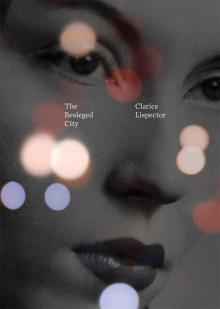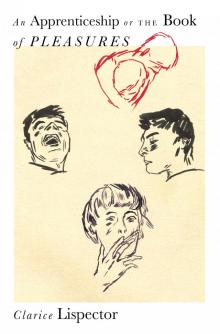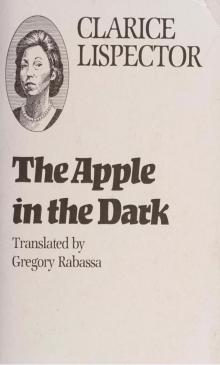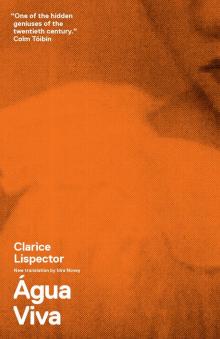- Home
- Clarice Lispector
An Apprenticeship or the Book of Pleasures Page 3
An Apprenticeship or the Book of Pleasures Read online
Page 3
“Until you discover, Ulisses — it doesn’t even want your indignity. It is the Silence. Is it the God?
“You can also try to trick it. Let as if by chance the book on the bedside table fall to the floor. But — horror — the book falls into the silence and gets lost in its mute and motionless whirl. And what if a crazed bird were to sing? Vain hope. The song would just cross the silence like a light flute. The thing that most resembled, in the realm of sound, the silence, was a flute.
“So, if you dare, you stop fighting. Do you enter it, go into it to Hell? You go with it, we the only ghosts of a night in Bern. Enter. Don’t wait out the rest of the darkness before it, just the silence itself. It will be as if we were in a ship so uncommonly enormous that we didn’t realize we were in a ship. And as if it were sailing so slowly that we didn’t realize we were moving. A man can’t do more than this. Living on the edge of death and of the stars is a tenser vibration than the veins can stand. There’s not even a son of a star and a woman as a merciful intermediary. The heart must present itself alone to the Nothing and alone beat out in silence its palpitations in the shadows. You only sense your own heart in your ears. When it presents itself completely naked, it’s not even communication, it’s submission. For we were only made for the little silence, not for the silence of the stars.
“And if you don’t dare, don’t enter. Wait out the rest of the darkness before the silence, only your feet wet from the surf of something that spreads out inside us. Wait. One insoluble in the other. One beside the other, two things that do not see one another in the darkness. Wait. Not for the end of silence but for the blessed help of a third element: the light of dawn.
“Afterward you never again forget it, Ulisses. There’s no point even in fleeing to another city. For when you least expect it you’ll recognize it — suddenly. While crossing the street amidst the beeping of horns. Between one ghostly cackle and another. After an uttered word. Sometimes in the very heart of a word you recognize the Silence. The ears are spooked, the gaze goes blank — there it is. And this time it’s a ghost.”
Writing brought her relief. She had bags under her eyes after the sleepless night, was tired, but for an instant — ah how Ulisses would want to know — happy. Because, if she hadn’t expressed the inexpressible silence, she’d spoken like a monkey who grunts and makes incoherent gestures, transmitting who knows what. Lóri was. What? But she was.
What was really happening with Lóri was that, due to a decision so deep that the reasons for it escaped her — she had out of fear cut out pain. Only with Ulisses had she come to learn that you can’t cut out pain — otherwise you’d suffer all the time. And she had cut it out without even having some other thing that in itself could stand in for the vision of things through the pain of existence, as before. Without pain, she’d been left with nothing, lost in her own world and in the wider world without any connection to people.
It was then that Ulisses had turned up in her life. He, who had been interested in Lóri only because of desire, was now seeming to see how out of reach she was. And more than that: not just out of reach for him but for herself and for the world. She was living off a tightness in her chest: life.
That’s when their meetings had begun: she only seemed to want to learn something from him and had deceived herself thinking she wanted to learn because he was a professor of Philosophy, using him in that hope. When the hope died, upon seeing that he hadn’t the slightest intention of teaching her a “philosophical” or “literary” way to live, it was already too late: she was bound to him because she wanted to be desired, above all she liked to be desired rather savagely when he’d drink too much. She’d already been desired by other men but what was new was Ulisses wanting her and waiting with patience — even when he was drunk, which didn’t make him lose control — and waiting with patience for her to be ready, while he would say of himself that he was in the middle of his apprenticeship, but so far beyond her that she was transforming into a tiny body, empty and in pain, just that. And she was longing for him exactly because he seemed to her like the border between the past and whatever was to come — whatever would come? Nothing, she’d think in despair. She was waiting, since she had nothing to do except teach in a primary school in the mornings or otherwise be on holiday as she was now, read a little, eat and sleep, and meet Ulisses who was barely transforming her, or if he was transforming her then not enough. And wait.
Yet it was her dread of a possible soul intimacy with Ulisses that made her annoyed with him. Was she in fact fighting her own intense urge to come closer to the impossible part of another human being? Ah, if only the pain were no longer there, and she were helping Ulisses by quickly applying herself to learning — what?—out of fear that in the end he would think it was now too late for her and gently draw back. It seemed to her nonetheless that she herself was getting in the way of their joint mission. Because though she didn’t know what she wanted, besides sleeping with him someday, she guessed that it was something so difficult to give and receive that he might draw back.
Lóri herself had a kind of dread of going, as if she could go too far — in what direction? Which was making it hard to go. She kept holding back a little as if holding the reins of a horse that could gallop off and take her God knows where. She was saving herself. Why and for what? What was she sparing herself for? There was a certain fear of her own capability, large or small, maybe because she didn’t know her own limits. Were the limits of a human divine? They were. But it kept seeming to her that, as a woman sometimes saved herself untouched in order to give herself one day to love, she might want to die still completely whole so that eternity would have all of her.
Did she want salvation? Pain had become stiffened and paralyzed inside her chest, as if she no longer wanted to use it as a way of living. But this precaution — that had come after Ulisses — was not yet the one that would save her: for instead of pain, nothing had come except a stop to the life of feelings. If salvation was what she was hoping for from Ulisses, would that be asking so much and so big that he’d decline? She’d never seen anyone save someone else, so she was afraid of an approach that would only disillusion her by confirming that one being cannot encroach on another the way shadows trespass on each other.
Sometimes she’d regress and succumb to a total irresponsibility: the desire to be possessed by Ulisses without binding herself to him, as she’d done with the others. But therein too she might fail: she was now a big-city woman but the danger was the strong rural heritage in her blood from way back. And she knew that this heritage could make her suddenly want more, telling herself: no, I don’t want to be just me, because I have my own I, what I want is the extreme connection between me and the sandy and perfumed earth. What she called earth had already become the synonym for Ulisses, so much did she want her ancestors’ earth. With the children she taught in the mornings, she hadn’t managed to become one with the earth, as if she weren’t ready to have the connection of a woman with whatever might represent sons and daughters. And there remained, still as a shadow of the dark pain of which she’d been made before Ulisses, the disheartening thought: whatever she was, was only a small part of herself.
Her immeasurable soul. For she was the World. And yet she was living so little. This was one of the sources of her humility and forced acceptance, and also kept her weak in the face of any possibility of action.
Moreover feeling overly humble was paradoxically where her haughtiness came from. For her haughtiness — which was reflected in her supple and calm way of walking — her haughtiness came from the obscure certainty that her roots were strong, and that her humility was not just human humility: for every root is strong, and her humility came from the obscure certainty that all roots are humble, earthy and full of a moist vigor in their gnarled rooted modesty.
Of course none of this was thought: it was lived, with the odd rapid sweeping beam in the night illuminating the sky for a fraction of a se
cond of thought in the dark.
What had also saved Lóri was that she was feeling that if her own world weren’t human, there would still be room for her, and with great beauty: she’d be a smudge of instincts, affections and ferocities, a shimmering irradiation of peace and struggle, the way she was humanly, but it would be permanent: because if her world weren’t human she’d be a creature. For an instant then she scorned whatever was human and experienced the silent soul of animal life.
And it was good. “Not understanding” was so vast that it surpassed all understanding — understanding was always limited. But not-understanding had no frontiers and led to the infinite, to the God. It wasn’t a not-understanding like that of a simpleton. What was good was having an intelligence and not understanding. It was a strange blessing like that of having madness without being crazy. It was a gentle disinterest toward the so-called matters of the intellect, a sweetness of stupidity.
But sometimes the unbearable anxiety would come: she wanted to understand enough so that she’d at least become more aware of everything she didn’t understand. Though deep down she didn’t want to comprehend. She knew it was impossible and every time she had thought she’d understood herself it was because she’d understood wrongly. Understanding was always a mistake — she preferred the largesse, so wide and free and without mistakes, of not-understanding. It was bad, but at least you knew you were in the full human condition.
Yet sometimes she’d guess right. There were cosmic streaks that substituted for understanding.
Lóri had already told Ulisses about the period, in Campos, when her parents were rich and would travel, staying in this country or that for months with their children, until, at the same time as her mother died, the family fortune was reduced to a third. Ulisses, despite only ever having traveled inside Brazil, had never asked her touristy questions. Nor did she ever describe places. Lóri had barely spoken of herself in other countries. She’d said little but he, through the attention he’d given her, seemed to have heard more than she’d told him.
She’d spoken of Paris but not of the land called Paris. She’d spoken of how the winter there was full of darkness at dusk and how it snowed bad snow, not the light kind but the thick kind, and even more: the frozen flakes borne on gusts of wind lashed her face already stiff with cold. She’d mentioned that one day, as it got dark, she’d started to cry quietly on a street corner. There was no one around, and so she’d started to talk to herself: “O God help me in this frozen darkness that is my own.”
— On that corner, she’d said to Ulisses in the same quiet voice, I felt lost, saved from some shipwreck and thrown onto a dark, cold, deserted beach.
Paris, suddenly, that strange land, had given her the oddest pain — that of her real perdition. Perdition was not the everyday truth but was the unreality that would let her sense her true condition. And everyone else’s.
She also told him how that same winter in Paris, she’d gone to a seamstress in a district far from the hotel. Inside she hadn’t noticed night fall and, in front of a lit fire, hadn’t realized that the cold with the early nightfall had turned freezing. It was the ninth of February. As she went out she was shocked to find it was night. She didn’t know the area and there weren’t many taxis, those going down that black street already had passengers. She didn’t know exactly how far she was from the hotel. She’d stood there waiting in vain for a taxi. And what if she forgot the name of the hotel? And suddenly she no longer had the slightest idea what it was called, such did the names of hotels in all the cities of the world resemble one another and she had lived or just stayed in so many. If she never again remembered the name of the hotel, no one would find her, she’d carry on living in that dirty black district with its blackened buildings, isolated from the rest of Paris and would have to change her life in order to survive. She’d live right there where she’d got lost: it was rare for a person to touch their own perdition. In order to eat would she prostitute herself? Because of the way she was it seemed easier and less distressing than working a shop counter.
She’d lost all sense of how much time she was there that night. It had grown so cold that some men had lit a fire that was the color of intense flames in a barrel on the sidewalk. She too drew close and, like the men, in order not to feel the growing numbness in her freezing feet, she would sometimes stamp her feet imitating them and, again imitating them, rubbing her gloved hands together — until suddenly the unexpected: the empty taxi passing.
She hailed it. And the hotel’s name? “Keep going,” she said to the driver. “Going where?” he replied grumpy like all Parisian taxi drivers. “Keep going,” she replied with feigned sternness. Had she really forgotten the hotel’s name? She felt as she had when as a child she’d taken part in plays, and in the wings, before going on stage, she’d shiver with fright because she’d simply forgotten the first lines of what she was supposed to say. Although, once she took to the stage, she’d suddenly talk like a sleepwalker, and only later would gradually become aware of herself and of the audience and manage to perform her role.
It was the taxi’s sudden braking, accompanied by the driver’s swearing, that gave her the shock she needed and suddenly she remembered the name of the hotel. She said it to the driver and immediately collapsed into a muffled sob of relief and suffering.
Ulisses had listened with a knitted brow. And then said:
— And so you didn’t want any more of that. And you stopped the possibility of pain, which no one gets away with. You just stopped and found nothing beyond it. I’m not saying I have much, but I still have intense searching and violent hope. Not that quiet and sweet voice of yours. And I don’t cry, if I need to one day I’ll scream, Lóri. I’m in the middle of a struggle and much closer to whatever people call a poor human victory than you, but it is a victory. I could already have you with my body and soul. I’ll wait for years if I must for you too to have a soul-body in order to love. We’re still young, we can waste some time without wasting our whole lives. But look at everyone around you and see what we’ve made of ourselves and considered our daily victory. We haven’t loved, that most of all. We haven’t accepted what we don’t understand because we don’t want to look stupid. We’ve hoarded things and reassurances because we don’t have each other. We don’t have any joy that hasn’t already been catalogued. We’ve built cathedrals, and stayed outside because the cathedrals we ourselves built, we’re afraid they’re traps. We haven’t surrendered to ourselves, because that would be the start of a long life and we’re afraid of that. We’ve avoided falling to our knees in front of the first one of us who says, out of love: you’re afraid. We’ve organized smiley clubs and associations where you are served with or without soda. We’ve tried to save ourselves but without using the word salvation in order to avoid the embarrassment of being innocents. We haven’t used the word love so as not to have to recognize its contexture of hate, love, jealousy and so many other contradictories. We’ve kept our death a secret in order to make our life possible. Many of us make art because we don’t know what the other thing is like. We’ve disguised our indifference with false love, knowing that our indifference is disguised anguish. We’ve disguised with a small fear the greatest fear of all and that’s why we never speak of what really matters. Speaking about what really matters is considered a blunder. We haven’t worshipped because we have the sensible pettiness to remember on time the false gods. We haven’t been pure and naive in order not to laugh at ourselves and so that at each day’s close we can say “at least I didn’t do something stupid” and that way we don’t feel confused before putting out the light. We’ve smiled in public about things we wouldn’t smile about alone. We’ve called our candor weakness. We have feared each other, most of all. And all this we consider our daily victory. But I escaped that, Lóri, I escaped with the ferocity of someone escaping the plague, Lóri, and I’ll wait until you too are more ready.
Lóri was always amazed at how wel
l Ulisses knew her. But despite his ability to understand, she feared his criticisms or that he might lose heart and abandon her, and had never told him that the “trouble” often returned: the air inside her would then smell of damp dust. Is it going to start up again, dear God? She’d then wonder. And gather all her strength to stop the pain. What pain was it? Of existing? Of belonging to some unknown thing? Of having been born?
And later, the pain staunched as if it had never been, exhausted, after having swum for miles in the empty universe, she’d throw herself panting on the shining sands of a planet, immobile, face down.
She also hadn’t told Ulisses how the painful sensation of being unattached was less intense once she really was unattached: her father having lost most of his fortune, she’d moved on her own from Campos to Rio, bought the little apartment where she lived, provided for regally by an allowance from her father. With four brothers, and she the only daughter, her father sent her whatever she wanted. With a third of the fortune left over there was enough to live like the rich but luckily for her nonstop travel in Europe was no longer an option. She hadn’t told Ulisses out of a sense of shame: he was, as far as she’d understood, a socialist and wouldn’t without disgust or scorn let himself be friends with her without contempt.

 The Stream of Life
The Stream of Life The Complete Stories
The Complete Stories The Hour of the Star
The Hour of the Star The Besieged City
The Besieged City An Apprenticeship or the Book of Pleasures
An Apprenticeship or the Book of Pleasures The Chandelier
The Chandelier A Breath of Life
A Breath of Life The Apple in the Dark
The Apple in the Dark Agua Viva
Agua Viva Complete Stories
Complete Stories Near to the Wild Heart
Near to the Wild Heart The Hour of the Star ()
The Hour of the Star () The Passion According to G.H.
The Passion According to G.H. The Passion According to GH
The Passion According to GH